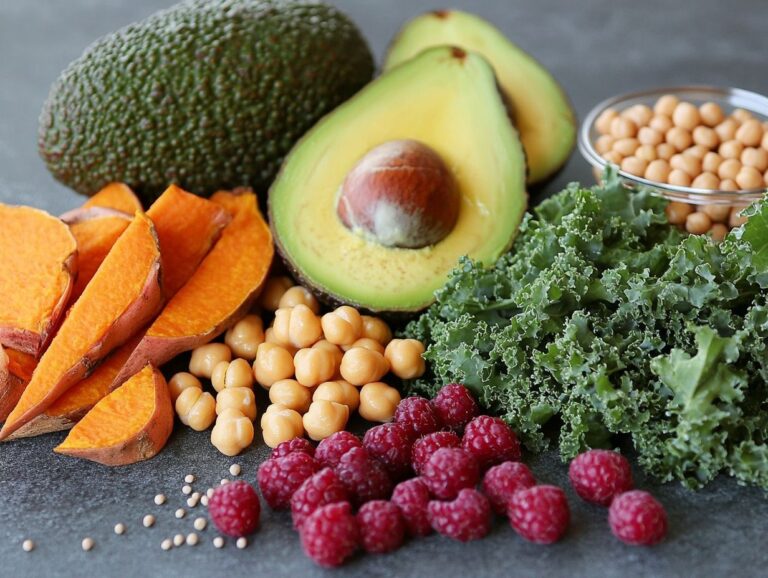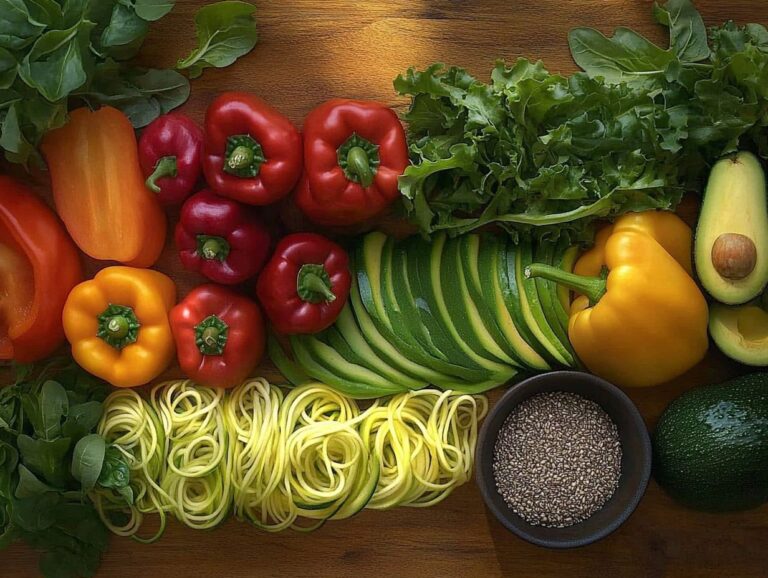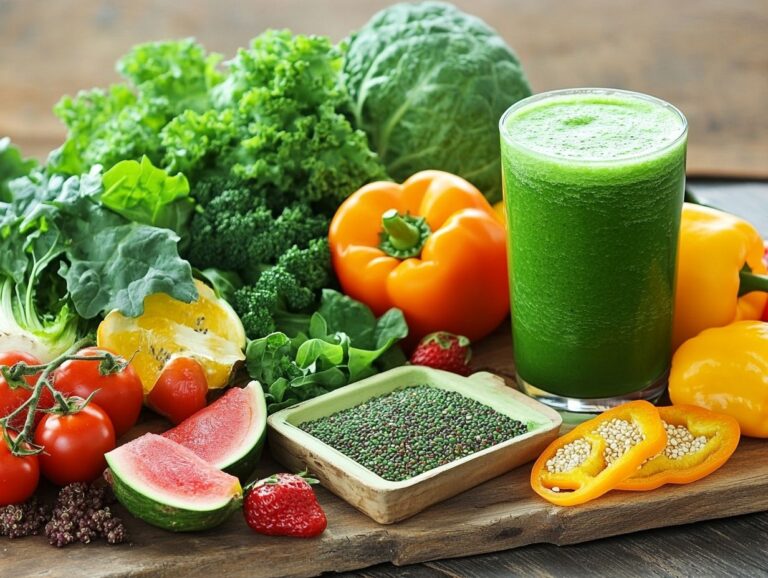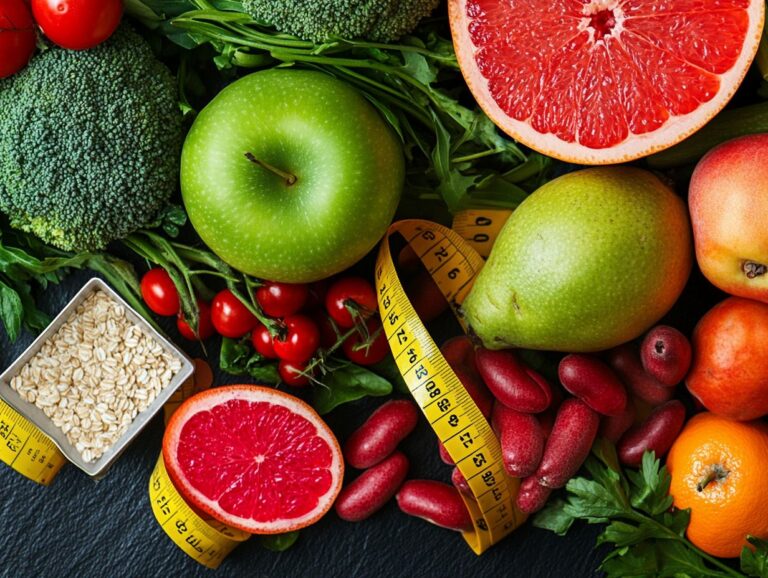Curious about veganism? This article explores the details of a vegan diet, from its health benefits to potential drawbacks.
Discover how adopting a plant-based lifestyle can lower your risk of chronic diseases, improve digestion, and assist with weight management.
It’s not all smooth sailing; we will also discuss nutrient deficiencies and the social challenges that can arise.
Before you make the leap, we provide essential considerations to help you navigate your vegan journey effectively.
What is Veganism and a Vegan Diet?
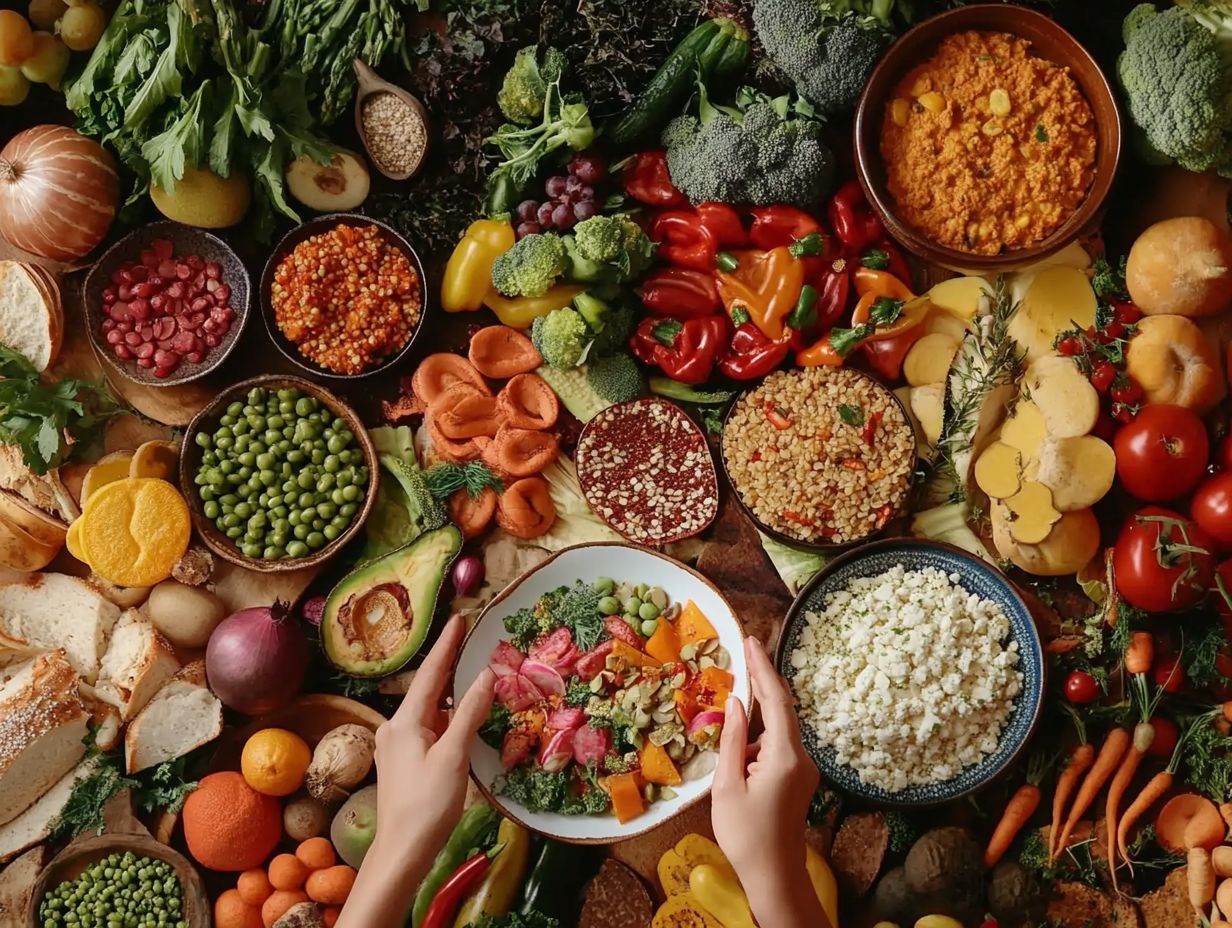
A vegan diet is a health-conscious and ethical eating approach that excludes all animal products, such as meat, dairy, eggs, and honey. Instead, it focuses on a plant-based diet that is rich in fruits, vegetables, whole grains, legumes, nuts, and seeds. This diet is often adopted by dietary vegans who are committed to principles of animal welfare and environmental sustainability.
Individuals may choose this dietary lifestyle due to a commitment to animal welfare, environmental sustainability, and the potential personal health benefits. By adopting mindful eating practices, individuals can significantly influence their risk of chronic diseases like diabetes, hypertension, and heart disease, and enhance their overall health outcomes.
What are the Advantages of Following a Vegan Diet?
The health benefits of a vegan diet include a reduced risk of heart disease, certain cancers, and type 2 diabetes, contributing to a healthier lifestyle characterized by improved digestive health, effective weight management, and reduced health risks associated with these chronic diseases.
Studies indicate that a well-planned vegan diet, which emphasizes variety and nutrient-dense plant foods, can serve as an anti-inflammatory diet and may even be considered a Mediterranean vegan diet, leading to better health outcomes over time.
1. Lower Risk of Heart Disease and Hypertension
Studies indicate that individuals following a vegan diet have a 32% lower risk of heart disease and hypertension compared to omnivores. This reduction is attributed to lower intakes of saturated fats found in animal products and higher consumption of fiber-rich foods, which provide essential nutrients that promote heart health.
Such dietary choices help control high blood pressure and improve overall diet quality. Additionally, the antioxidants and phytochemicals present in plant foods can decrease inflammation and oxidative stress, both of which are risk factors for heart disease and hypertension.
Whole grains, fruits, and vegetables offer valuable micronutrients that further enhance a vegan diet without imposing dietary restrictions. Furthermore, healthy fats from avocados and nuts can improve lipid profiles and support heart health. Including foods such as tofu, seitan, and tempeh can also provide valuable protein sources.
Adopting a vegan diet also significantly reduces greenhouse gas emissions from livestock, demonstrating how individual choices can have a positive environmental impact. Sustainable foods are a key aspect of this lifestyle, promoting both environmental welfare and personal health benefits.
2. Reduced Risk of Certain Cancers and Chronic Diseases
Research indicates that a vegan diet rich in fruits and vegetables, which contain antioxidants and phytochemicals, is associated with a reduced risk of certain cancers, particularly colorectal and breast cancer. The nutritional quality of a plant-based diet plays a critical role in cancer prevention, with a strong emphasis on consuming unrefined and minimally processed foods. This dietary pattern can also be considered an alkaline vegan diet due to its potential to reduce inflammation and balance body pH levels.
Numerous studies demonstrate that these foods offer not only essential vitamins and minerals but also a diverse array of compounds that positively impact the body’s ability to combat oxidative stress and inflammation—both linked to cancer development. A wide selection of colorful fruits and vegetables, legumes, nuts, and whole grains provides those following a vegan diet with numerous health benefits that extend beyond cancer prevention, including a lower risk of chronic diseases such as heart disease and type 2 diabetes.
This diverse diet not only supports overall well-being but also underscores the importance of food choices in achieving long-term health and preventing chronic diseases.
3. Improved Digestive Health and Nutrient Absorption
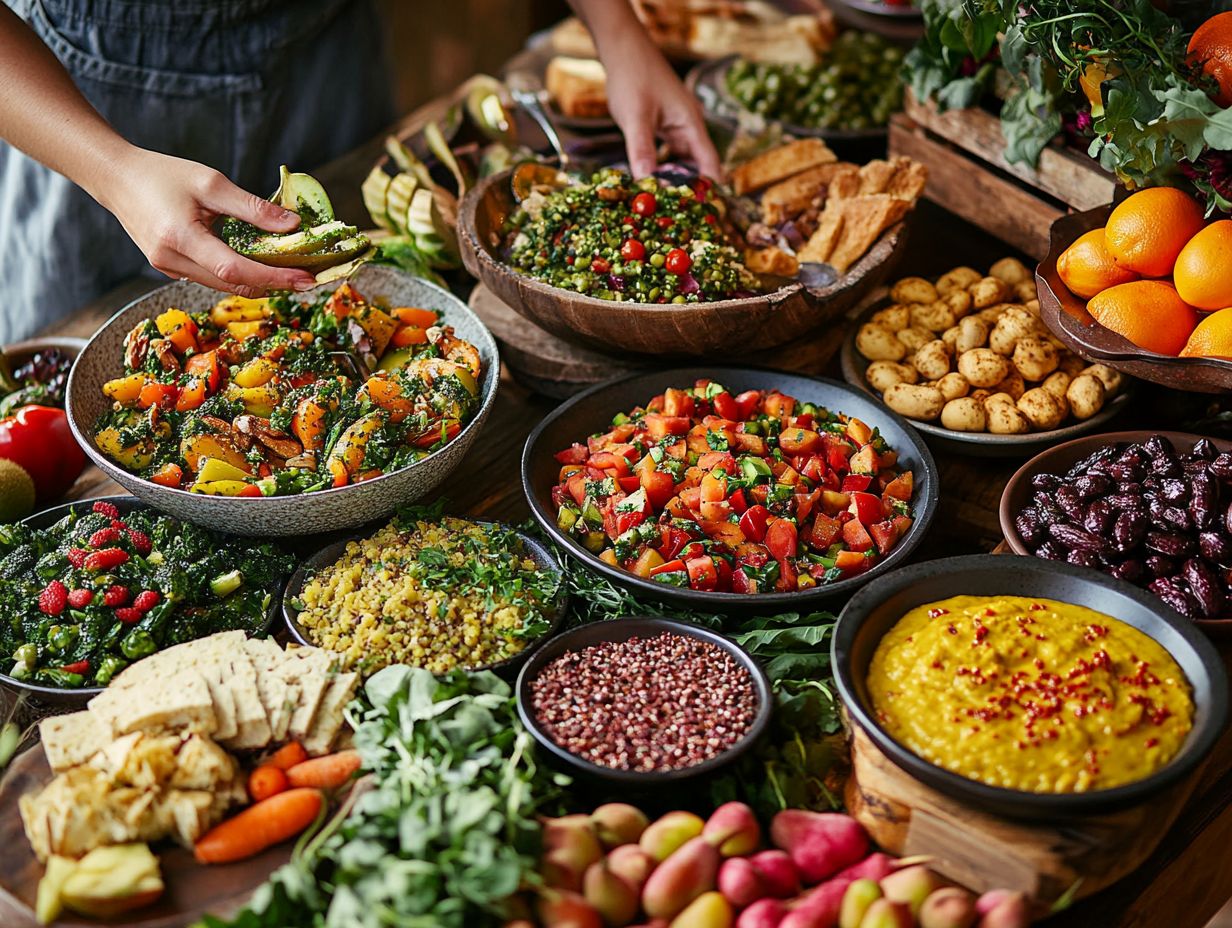
A vegan diet positively impacts digestive health, primarily due to its high fiber content found in fruits, vegetables, and whole grains. This fiber promotes regular bowel movements and supports a healthy gut microbiome.
Additionally, a vegan diet can help alleviate digestive ailments and reduce the risk of gastrointestinal disorders. Incorporating a diverse range of high-fiber foods such as legumes, seeds, and nuts further enhances gut health. Vegan recipes that include a variety of these foods can make meal planning easier and more enjoyable.
These foods not only provide essential nutrients but also help minimize nutritional deficiencies commonly associated with restrictive diets. Moreover, consuming sustainable foods as part of a vegan diet benefits both personal health and the environment. Individuals can consider high-protein vegan options like tempeh and seitan to meet their protein needs.
By emphasizing high-fiber options, individuals can experience improved digestive function, leading to better nutrient absorption and overall health.
4. Better Weight Management and Weight Loss
A vegan diet offers several advantages, including improved weight control and weight loss due to its lower calorie density and higher nutritional quality. Transitioning to a vegan diet encourages mindful eating and healthier food choices. A well-planned vegan meal plan can help individuals achieve their weight loss goals effectively.
The emphasis on whole foods in a vegan diet results in a higher intake of fruits, vegetables, legumes, nuts, and whole grains, which are typically lower in calories and higher in fiber. This combination helps individuals feel full, supports portion control, and reduces the likelihood of overeating.
Additionally, the nutritional density of these foods allows for a diverse range of flavors and textures while providing essential vitamins and minerals. Other benefits of a well-balanced vegan diet include a reduced risk of chronic diseases and lower food costs, as plant-based meals are often less expensive than meat-based options. Consider vegan-friendly and low-carb vegan alternatives to maintain variety and address specific dietary needs.
5. Reduced Risk of Type 2 Diabetes and Improved Quality of Life
A vegan diet can help prevent type 2 diabetes by enhancing insulin sensitivity and promoting a healthy body weight through the consumption of nutrient-rich, low-glycemic foods. This dietary pattern has been linked to an improved quality of life, particularly for individuals at risk of chronic diseases. Vegan diabetic meal plans can be developed to further address the needs of individuals with diabetes.
Recent studies indicate that those following a plant-based diet have a lower prevalence of type 2 diabetes, with one study showing a 23% reduction in risk among vegans compared to non-vegans. This finding suggests that mindful eating practices that include fruits, vegetables, whole grains, and legumes contribute to positive weight management and metabolic outcomes. A vegan keto diet can also be considered for those seeking low-carb options.
Individuals interested in preventing chronic diseases can enjoy a diverse array of culinary options while focusing on nutrient-dense foods, thereby promoting long-term health and resilience against diabetes.
What are the Disadvantages and Challenges of a Vegan Diet?
A vegan diet offers numerous benefits but may also present certain challenges. One potential issue is nutrient deficiencies; since a vegan diet excludes animal products, it may lack essential nutrients such as vitamin B12, vitamin D, calcium, iron, iodine, protein, and omega-3 fatty acids. These nutritional deficiencies can be mitigated with proper planning and the inclusion of fortified foods or supplements.
If not properly monitored and managed, these deficiencies can lead to serious health risks. Additionally, the inherently restrictive nature of a vegan diet may limit food choices, resulting in less variety in flavors and dishes compared to other diets. This can lead to challenges in maintaining a diverse and satisfying dietary pattern, potentially affecting overall health outcomes.
This limitation can complicate meal planning and may leave some individuals feeling less satisfied with their meals. Furthermore, individuals following a vegan diet often face dietary restrictions when dining out or attending social gatherings, making it more challenging to participate in shared meals. This situation may contribute to a sense of social isolation for some individuals.
1. Nutritional Deficiencies and Health Risks
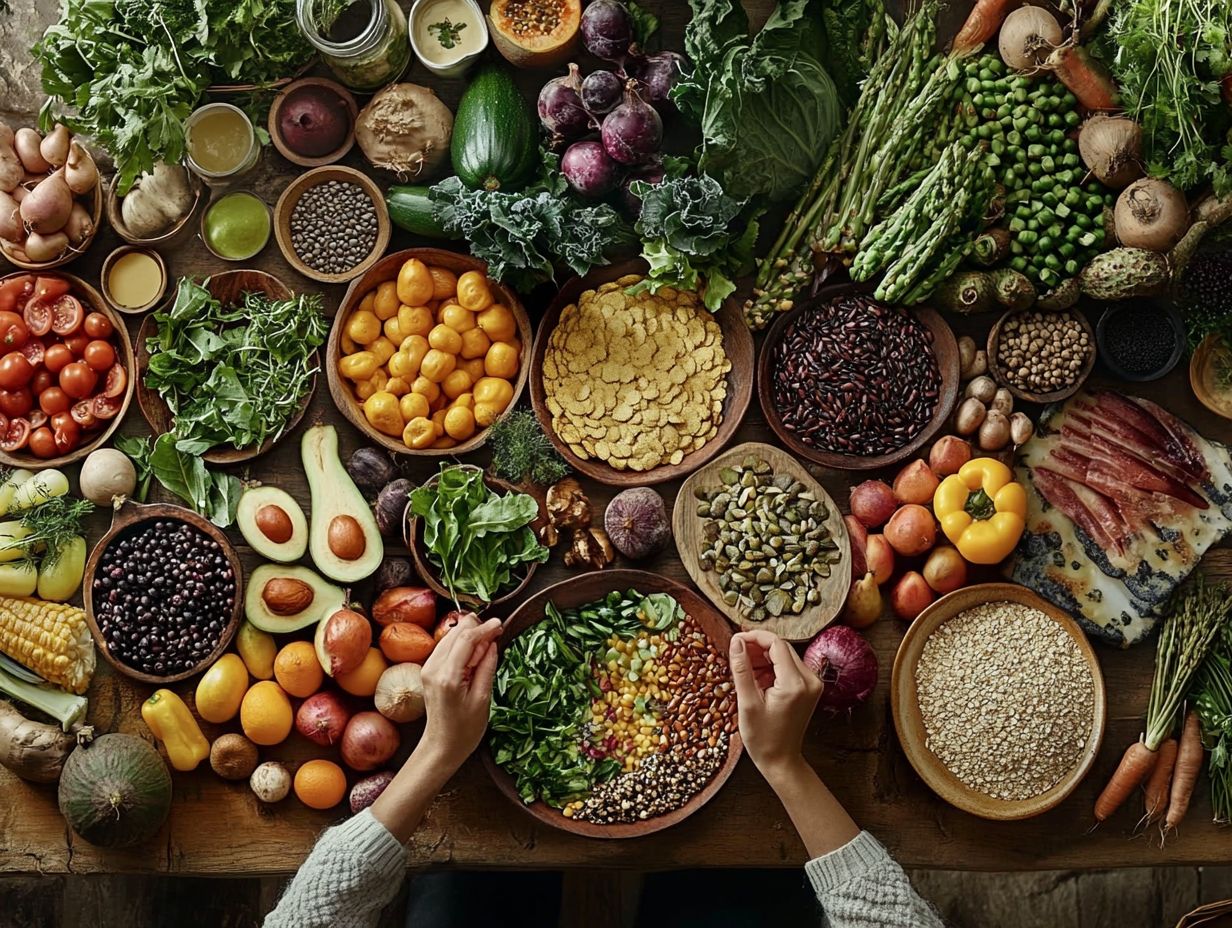
Individuals following a vegan diet face the key risk of nutritional deficiencies due to the lack of vitamin B12, calcium, omega-3 fatty acids, and iron, which are primarily found in animal-based food sources. Adequate intake of these essential nutrients is crucial for maintaining proper health and avoiding serious health risks like osteoporosis.
To avoid these deficiencies, vegans should seek out fortified foods and other alternative sources. Here are some options to ensure adequate nutrient intake and maintain nutritional quality:
- Vitamin B12: Fortified plant-based milk, nutritional yeast, and other fortified foods
- Calcium: Fortified tofu, leafy greens, almonds, and other calcium sources
- Omega-3 fatty acids: Flaxseeds, chia seeds, walnuts, and other omega-3 fatty acids sources
- Iron: Legumes, lentils, and other iron sources (best consumed with bell peppers and other vitamin C-rich foods to enhance absorption)
By incorporating these nutrient-dense foods into their diet, individuals on a vegan diet can mitigate the health risks associated with dietary deficiencies.
2. Limited Food Choices and Dining Out Challenges
A vegan diet can present limited food options, especially when dining out. Many restaurants do not provide enough vegan choices or substitutes, leading to a greater reliance on processed foods that may diminish the nutritional quality of the diet. This is particularly challenging for those following a raw vegan or alkaline vegan dietary pattern.
This lifestyle choice often requires consumers to navigate menus that predominantly feature meat and dairy options. Additionally, the limited options are often exacerbated by the higher prices of specialty vegan ingredients, which can affect food costs and accessibility.
To address these challenges, individuals can proactively research restaurants that are known for accommodating various dietary needs, communicate their preferences to restaurant staff, and carry a few convenient snacks to help them stay on track. Identifying vegan-friendly restaurants and planning ahead can ensure a more enjoyable dining experience.
Developing ingredient literacy can give the power to individuals to make informed choices, ensuring they select meals with a higher whole-food content and enhancing their dining experience. Understanding food variety and ingredient lists can also help in identifying suitable vegan meal options.
3. Difficulty Meeting Protein Needs and Ensuring Nutritional Balance
For many people adopting a vegan diet, the lack of traditional protein sources such as meat and dairy can pose a challenge, making it essential to consume a wide variety of foods to ensure adequate protein intake. Including high-protein vegan options such as tofu, seitan, tempeh, and legumes can help meet this need.
High-protein vegan options, including legumes, nuts, and seeds, can help address this issue. It is important for individuals following a vegan diet to be aware of various foods that are both high in protein and vegan-friendly.
This includes incorporating grains like quinoa and farro, which provide protein along with other essential nutrients. Tofu and tempeh serve as versatile meat substitutes, while chickpeas and lentils can easily be added to salads and soups.
By diversifying their food choices, individuals on restricted diets can ensure they meet their protein needs, which are vital for maintaining muscle mass and overall health.
4. Potential for Disordered Eating
The strictness of veganism can create a potential for disordered eating, as some individuals may develop an unhealthy obsession with food, viewing it as something to restrict rather than enjoy.
This mindset can lead to social withdrawal from communal eating experiences and gatherings. The pressure to adhere to strict dietary guidelines can heighten anxiety and stress, particularly in situations where food options are abundant but do not align with a vegan lifestyle.
Consequently, social connections may become strained, as outings for lunch, dinner, and other events can transform from enjoyable experiences into challenges. Friends and family might not fully understand these dietary choices, leading to miscommunication or feelings of alienation.
These consequences can negatively impact mental health and diminish the enjoyment of social interactions, as individuals struggle to find a balance between dietary commitments and social enjoyment.
5. Social Challenges

People following a vegan diet often face social challenges. Many report feeling socially isolated during mealtimes with family and friends who do not share their lifestyle, which can lead to feelings of exclusion. Dining out can further complicate matters, as many restaurants lack adequate vegan options, making social gatherings more difficult. These challenges can result in uncomfortable moments and misunderstandings, particularly when dietary choices are questioned.
To navigate these social hurdles, effective communication is essential for those on a vegan diet. It is important to communicate dietary preferences in advance, especially when dining out.
- Suggesting restaurants that offer a variety of vegan options can enhance the experience and foster understanding among loved ones.
- Additionally, being proactive by bringing vegan snacks or dishes to parties or potlucks can promote inclusivity, allowing everyone to share in the experience of eating together without compromising individual values.
Ultimately, adjusting dietary choices to fit the social environment can help maintain relationships and enhance the overall social experience.
What Should You Consider Before Starting a Vegan Diet?
Before starting a vegan diet, it is essential to consider personal health needs, budget, cooking skills, and the availability of supportive people in one’s life, as these factors significantly influence the likelihood of success and adherence to the diet.
Furthermore, understanding the level of motivation and commitment to making lasting changes in one’s lifestyle is also crucial.
1. Your Personal Health Needs
Assessing personal health needs is crucial before adopting a vegan diet, as individual nutritional requirements and existing health conditions can significantly influence the success of the dietary transition.
Understanding how veganism aligns with personal health goals can lead to improved health outcomes, particularly for those with chronic diseases. Transitioning to a plant-based diet requires a personalized plan, especially for individuals with specific health concerns such as diabetes, hypertension, and heart disease.
It is essential to prioritize nutritional quality by emphasizing whole foods that are rich in vitamins, minerals, and essential fatty acids. Incorporating foods like lentils, chickpeas, and a diverse array of fruits and vegetables can help maintain blood sugar levels and promote heart health.
Additionally, supplements for nutrients such as vitamin B12 and omega-3 fatty acids may be necessary to address gaps that are challenging to fill on a strictly vegan diet.
Consulting with a healthcare provider can ensure tailored dietary recommendations, helping to guarantee that the transition is beneficial for one’s health while adequately meeting nutritional needs.
2. Your Budget
Establishing a budget when starting a vegan diet is essential, as food costs can vary significantly based on whether individuals choose whole, minimally processed foods (the most affordable option) or opt for more expensive vegan alternatives and specialty items. A well-planned vegan meal strategy can help limit expenses while ensuring access to sustainable food options.
To effectively manage costs while shopping, consider the following tips:
- Buy in bulk when possible: Purchasing in bulk often lowers the price per unit for staples such as grains, legumes, and nuts.
- Choose seasonal produce: Incorporating seasonal fruits and vegetables into meals not only maximizes flavor and nutrition but also substantially reduces costs.
- Prepare a shopping list: Creating a list of needed items based on planned meals can help prevent unnecessary impulse purchases.
- Select versatile ingredients: Focusing on ingredients that can be used in a variety of dishes will save both preparation time and money. This approach makes it easier to adhere to dietary restrictions while fulfilling the requirements of a healthy diet.
3. Your Cooking Skills and Time Availability
Your cooking skills and time availability are crucial factors in successfully adopting a vegan diet. The ability to prepare meals from scratch can enhance your enjoyment of the variety and satisfaction that a vegan diet offers. Learning simple vegan recipes can facilitate a smoother and more enjoyable transition.
It’s essential to consider your cooking skills and the amount of time you can dedicate to meal prep each week. For those with limited cooking experience or constrained time, quick and easy vegan meals become essential.
For instance, stir-fried vegetables with tofu or a simple quinoa salad with canned chickpeas and herbs require minimal time to prepare and can be quite delicious. Utilizing pre-chopped vegetables or canned legumes can significantly reduce prep time while still resulting in a tasty and healthy meal.
4. Your Support System
A strong support system is essential for successfully transitioning to any diet, and community support can help alleviate feelings of social isolation. By providing additional resources and options for exploration, community support creates a network of encouragement for those embarking on a vegan journey. Being part of a community of like-minded individuals reinforces commitment to a new diet.
Initially, maintaining a vegan diet can be challenging, especially when navigating social situations such as dining out with non-vegans or attending family gatherings that may lack vegan options. This is where a supportive community becomes invaluable. Having a network of people who share similar values can make it easier to navigate these situations.
Mindful eating is another important aspect of fostering a sense of community. Sharing recipes, planning meals together, and even cooking collectively are effective ways to strengthen these bonds.
Online forums, local vegan meet-ups, and social media groups can serve as excellent platforms for building lasting relationships while finding inspiration and support on the journey toward a compassionate lifestyle.
5. Your Motivation and Commitment
Understanding your motivation and commitment to adopting a vegan diet is crucial for long-term success. Recognizing your purpose can help you navigate obstacles and maintain your dedication to this lifestyle change.
Focusing on the health benefits and mindful eating practices associated with a vegan diet can further reinforce your motivation. By examining personal motivations—such as ethical, environmental, or health concerns—you can solidify your commitment to a vegan lifestyle.
Learning about alternatives to traditional foods, like plant-based proteins and dairy substitutes, enables individuals to create meals that are both satisfying and aligned with their values. Implementing consistent routines, such as meal planning and seeking community support, is essential for strengthening your dedication.
Additionally, regularly reminding yourself of how nutrition impacts your health and energy levels can give the power to you to make dietary choices that facilitate a healthier lifestyle and support your goals.
